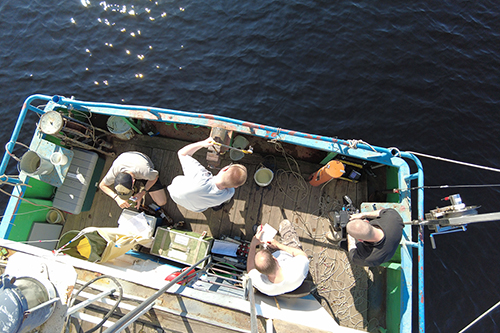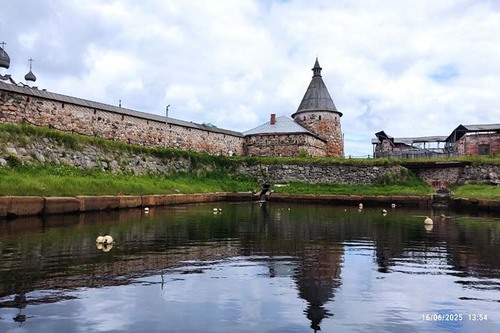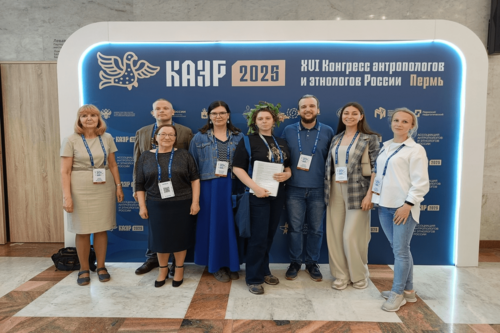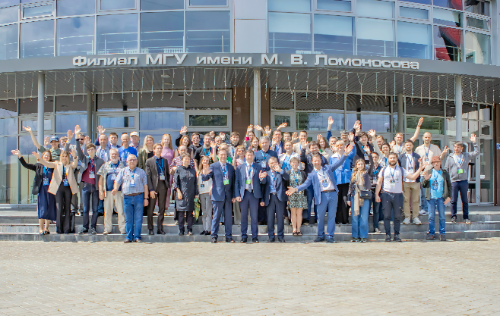News
See also:

July 28, 2025
Researchers monitor the state of Lake Onego under climate change and human impact
Staff of the Northern Water Problems Institute KarRC RAS are back from an expedition that covered larger bays and deep-water regions of Lake Onego. The multidisciplinary studies both provide new data on the wellbeing of the lake ecosystem through modern analysis methods and permit tracing the changes relying on over 60-year-long own observation series. Annual monitoring is especially important for evaluating the combined effect of climate change and human impact on the lake.
Staff of the Northern Water Problems Institute KarRC RAS are back from an expedition that covered larger bays and deep-water regions of Lake Onego. The multidisciplinary studies both provide new data on the wellbeing of the lake ecosystem through modern analysis methods and permit tracing the changes relying on over 60-year-long own observation series. Annual monitoring is especially important for evaluating the combined effect of climate change and human impact on the lake.

July 24, 2025
Karelian scientists assess the consequences of human impact on Solovki ecosystem
In 2025, KarRC RAS scientists continued field surveys in Blagopoluchiia Bay, Solovetsky Archipelago, White Sea. Two expeditions have already taken place – in winter and in summer, and one more is coming in August. Scientists explore the human impact on the archipelago’s nature, both in the bay waters and on adjacent land. They have detected an unusual ice structure, collected sediment cores to assess the pollution level, described the composition of the flora in the intertidal zone and the coastal meadows.
In 2025, KarRC RAS scientists continued field surveys in Blagopoluchiia Bay, Solovetsky Archipelago, White Sea. Two expeditions have already taken place – in winter and in summer, and one more is coming in August. Scientists explore the human impact on the archipelago’s nature, both in the bay waters and on adjacent land. They have detected an unusual ice structure, collected sediment cores to assess the pollution level, described the composition of the flora in the intertidal zone and the coastal meadows.

July 22, 2025
Karelian scientists delivered their research results at the Russian Congress of Anthropologists and Ethnologists
Researchers of the Institute of Linguistics, Literature and History KarRC RAS took part in the Russian Congress of Anthropologists and Ethnologists. The scientists presented the results of their studies on the material culture, calendarian rites, ethno-cultural interactions in Northern Eurasia, cognitive studies of ethnicity, ethno-demographic processes, and other ethnology topics.
Researchers of the Institute of Linguistics, Literature and History KarRC RAS took part in the Russian Congress of Anthropologists and Ethnologists. The scientists presented the results of their studies on the material culture, calendarian rites, ethno-cultural interactions in Northern Eurasia, cognitive studies of ethnicity, ethno-demographic processes, and other ethnology topics.

July 10, 2025
Mathematicians from KarRC RAS shared their expertise in modeling interactions of hydrogen isotopes with structural materials at an event in Sarov
International School “Interaction of Hydrogen Isotopes with Structural Materials” was held at the National Center for Physics and Mathematics in Sarov, Novgorod Region. Karelian scientists gave a lecture and presentations on computational materials science – an efficient tool for rescaling test-sample experimental data to real-life power reactor structures.
International School “Interaction of Hydrogen Isotopes with Structural Materials” was held at the National Center for Physics and Mathematics in Sarov, Novgorod Region. Karelian scientists gave a lecture and presentations on computational materials science – an efficient tool for rescaling test-sample experimental data to real-life power reactor structures.




